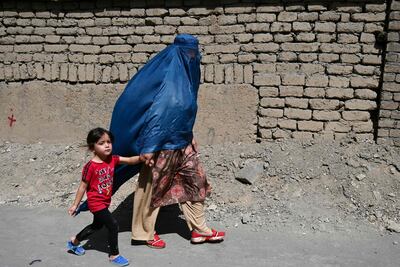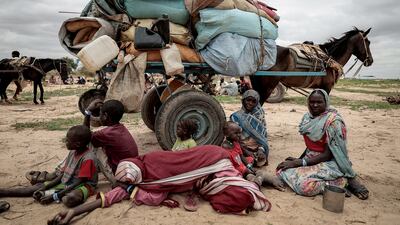The suffering of our times has many faces. An Afghan mother dies in childbirth every two hours. Injured families are brought to barely functioning hospitals daily in Gaza while grieving Israelis tattoo 7/10 on their skin as reminders of October’s deadly attack by Hamas. Fires rip through overcrowded Rohingya camps in Bangladesh destroying ramshackle refugee shelters. Ethiopia’s starving Tigrayans compete with birds to pick bits of grain from parched fields. Survivors of sexual violence in Darfur endure their pain in silence. West African migrants, desperate to reach Europe, disappear into the cold depths of the Atlantic. Traumatised Syrians shelter amid the rubble a year after a devastating earthquake.
Disabled Ukrainian children take refuge in a sanatorium when an incoming drone explodes nearby.
Each person suffers in their own way, regardless of the cause of their wounds. But the root of their suffering is the same. It is the inhumanity that accompanies the way we settle disputes. Egregious human rights abuses, war crimes and violations of international humanitarian law are normalised in armed conflicts today.
Driving this is the changed nature of wars. They are often endless because there are no settled winners, and losers refuse to acknowledge defeat. And so sieges and blockades are used to sap an adversary’s will by depriving them of food, water and medicine.
The current one-size-fit-all global package of universal humanitarianism was a product of its post Second World War era
Such gambits – including so-called smart sanctions by the international community – are impossible to target accurately on fighters. They are skilled at avoidance through a combination of constructing profitable war economies, preying on trapped civilians as in Yemen and Sudan, or through downright criminality as in Haiti and Ecuador. Inevitably, the wider community is impoverished and punished, as seen earlier in Iraq.
When conflicts run out of heat, chronic instability follows, as in Afghanistan, South Sudan or the Congo. Suffering gets prolonged for decades, exacerbated further by paroxysms of acute violence. Many people around the world know nothing else from cradle to grave other than the struggle to survive. The emotional and mental toll carries down generations with grievances magnified along the way.
The collective punishment of populations thereby becomes both cause and consequence of repeated cycles of violence. It is then easily manipulated into a deliberate tool for making and sustaining wars. This is further encouraged by the multidimensional nature of modern conflicts fought from behind computers as much as with guns. Armed combatants and keyboard warriors as well as those who enable them, such as some social media cheerleaders, occupy the same space. When wars become whole-of-society affairs, distinguishing those who should or not benefit from the protections of the Geneva Conventions is difficult.
Surrounded by foes, real or imagined, military commanders who are understandably keen to minimise their own casualties get pushed towards "no quarters given" tactics, implying that combatants are not taken prisoner, but killed. Innocent people who are inadvertently caught in the crossfire stand little chance. Especially so in today’s highly urbanised conflicts – whether in Kharkiv or Khan Younis – where fighters and civilians, paramedics and teachers, humanitarians and activists, old and young, live cheek by jowl.
One myth of modern war is that it can be waged with precision. That may be true with limited special forces operations or particular drone strikes as, for example, claimed by America against Iran-backed militia in Syria and Iraq. But it is more usual for conflict zones to be characterised by chaos and confusion. Eliminating the opponent in such contexts becomes even more of a military imperative, leading to frustrated cries of genocide, as is evident in conflicts around the world.
Significantly, none of these tactics are new even if the means and methods have changed over the ages – inducing mass starvation, for example, which is war’s oldest weapon is used as much today, whether in Tigray and Gaza, or Ukraine in 1933. The western allies named their wartime encirclement of Japan “Operation Starvation” and it took the US until 2015 to renounce such tactics in its revised defence manual.
The long history of conflict is therefore a tale of refinement of the art of inflicting suffering and pain on opponents. Some evolutionary psychologists say that our fundamental survival instinct fosters this through boosting the social glue of one’s own group and dehumanising feared opponents. This starts with malevolent rhetoric, as seen during the 1994 Rwanda and 2003 Darfur genocides. That is why the mutually hateful language of some Hamas and Israeli leaders is worrisome. More widely, the weaponisation of identity is the leitmotif of current conflicts and ethnic cleansing accusations are common.
Making war is not illegitimate if there is just cause. But what is justified is usually contentious and causes yet more strife.
If wars continue and as they are almost always accompanied by the cruel streak in human make-up, do we give up on humanity? Not at all. We know this almost subconsciously because of the better angels of our nature and from the daily experiences of little kindnesses we receive and give.
All faiths recognise the eternal struggle between good and evil, and preach moral codes to limit the extent of warfare and mitigate the accompanying suffering. Appropriate prescriptions and prohibitions have long been codified in all cultures. They were globalised through the humanitarian values, principles, conventions, and institutions of the Red Cross Red Crescent and UN that reference a rules-based international order.
So, why are we doing so badly in terms of living up to humanitarian ideals during conflicts? This is reflected in the way that the humanitarian system is increasingly underfunded, bypassed, instrumentalised, distrusted and disrespected. It is dramatically illustrated by charges against the UN Relief and Works Agency (UNRWA) in Palestine or the UN Development Programme in Iraq, and World Food Programme in Ethiopia, among other examples.
Performance failings and agency misbehaviours explain some of the discontent. But organisational reforms are insufficient when more fundamental factors are at play.
The current one-size-fit-all global package of universal humanitarianism was a product of its post Second World War era. It glosses over legitimate differences between peoples. The humanitarian consensus that has prevailed for decades is unravelling due to shifting geopolitics that embolden questionable perspectives to come forth.
One implication of this is that while most can agree on what is wrong with our humanity, we cannot easily agree on the right way to heal it. That need not be problematic if we recognise that the many ways of doing good must be allowed expression in their own contexts. Freeing people to help each other in whatever way they can is our hope in a conflict-stricken world. It is the way to narrow the gap between human suffering and its relief.
Live updates: Follow the latest from Israel-Gaza
Story%20behind%20the%20UAE%20flag
%3Cp%3EThe%20UAE%20flag%20was%20first%20unveiled%20on%20December%202%2C%201971%2C%20the%20day%20the%20UAE%20was%20formed.%C2%A0%3C%2Fp%3E%0A%3Cp%3EIt%20was%20designed%20by%20Abdullah%20Mohammed%20Al%20Maainah%2C%2019%2C%20an%20Emirati%20from%20Abu%20Dhabi.%C2%A0%3C%2Fp%3E%0A%3Cp%3EMr%20Al%20Maainah%20said%20in%20an%20interview%20with%20%3Cem%3EThe%20National%3C%2Fem%3E%20in%202011%20he%20chose%20the%20colours%20for%20local%20reasons.%C2%A0%3C%2Fp%3E%0A%3Cp%3EThe%20black%20represents%20the%20oil%20riches%20that%20transformed%20the%20UAE%2C%20green%20stands%20for%20fertility%20and%20the%20red%20and%20white%20colours%20were%20drawn%20from%20those%20found%20in%20existing%20emirate%20flags.%3C%2Fp%3E%0A
The five pillars of Islam
SCORES IN BRIEF
Lahore Qalandars 186 for 4 in 19.4 overs
(Sohail 100,Phil Salt 37 not out, Bilal Irshad 30, Josh Poysden 2-26)
bt Yorkshire Vikings 184 for 5 in 20 overs
(Jonathan Tattersall 36, Harry Brook 37, Gary Ballance 33, Adam Lyth 32, Shaheen Afridi 2-36).
Liverpool's all-time goalscorers
Ian Rush 346
Roger Hunt 285
Mohamed Salah 250
Gordon Hodgson 241
Billy Liddell 228
Islamophobia definition
A widely accepted definition was made by the All Party Parliamentary Group on British Muslims in 2019: “Islamophobia is rooted in racism and is a type of racism that targets expressions of Muslimness or perceived Muslimness.” It further defines it as “inciting hatred or violence against Muslims”.
UAE currency: the story behind the money in your pockets
More from Neighbourhood Watch:
Tributes from the UAE's personal finance community
• Sebastien Aguilar, who heads SimplyFI.org, a non-profit community where people learn to invest Bogleheads’ style
“It is thanks to Jack Bogle’s work that this community exists and thanks to his work that many investors now get the full benefits of long term, buy and hold stock market investing.
Compared to the industry, investing using the common sense approach of a Boglehead saves a lot in costs and guarantees higher returns than the average actively managed fund over the long term.
From a personal perspective, learning how to invest using Bogle’s approach was a turning point in my life. I quickly realised there was no point chasing returns and paying expensive advisers or platforms. Once money is taken care off, you can work on what truly matters, such as family, relationships or other projects. I owe Jack Bogle for that.”
• Sam Instone, director of financial advisory firm AES International
"Thought to have saved investors over a trillion dollars, Jack Bogle’s ideas truly changed the way the world invests. Shaped by his own personal experiences, his philosophy and basic rules for investors challenged the status quo of a self-interested global industry and eventually prevailed. Loathed by many big companies and commission-driven salespeople, he has transformed the way well-informed investors and professional advisers make decisions."
• Demos Kyprianou, a board member of SimplyFI.org
"Jack Bogle for me was a rebel, a revolutionary who changed the industry and gave the little guy like me, a chance. He was also a mentor who inspired me to take the leap and take control of my own finances."
• Steve Cronin, founder of DeadSimpleSaving.com
"Obsessed with reducing fees, Jack Bogle structured Vanguard to be owned by its clients – that way the priority would be fee minimisation for clients rather than profit maximisation for the company.
His real gift to us has been the ability to invest in the stock market (buy and hold for the long term) rather than be forced to speculate (try to make profits in the shorter term) or even worse have others speculate on our behalf.
Bogle has given countless investors the ability to get on with their life while growing their wealth in the background as fast as possible. The Financial Independence movement would barely exist without this."
• Zach Holz, who blogs about financial independence at The Happiest Teacher
"Jack Bogle was one of the greatest forces for wealth democratisation the world has ever seen. He allowed people a way to be free from the parasitical "financial advisers" whose only real concern are the fat fees they get from selling you over-complicated "products" that have caused millions of people all around the world real harm.”
• Tuan Phan, a board member of SimplyFI.org
"In an industry that’s synonymous with greed, Jack Bogle was a lone wolf, swimming against the tide. When others were incentivised to enrich themselves, he stood by the ‘fiduciary’ standard – something that is badly needed in the financial industry of the UAE."
Things Heard & Seen
Directed by: Shari Springer Berman, Robert Pulcini
Starring: Amanda Seyfried, James Norton
2/5
The biog
Favourite films: Casablanca and Lawrence of Arabia
Favourite books: Start with Why by Simon Sinek and Good to be Great by Jim Collins
Favourite dish: Grilled fish
Inspiration: Sheikh Zayed's visionary leadership taught me to embrace new challenges.
Match info
Premier League
Manchester United 2 (Martial 30', Lingard 69')
Arsenal 2 (Mustafi 26', Rojo 68' OG)
What can victims do?
Always use only regulated platforms
Stop all transactions and communication on suspicion
Save all evidence (screenshots, chat logs, transaction IDs)
Report to local authorities
Warn others to prevent further harm
Courtesy: Crystal Intelligence
Mohammed bin Zayed Majlis
Oppenheimer
%3Cp%3E%3Cstrong%3EDirector%3A%20%3C%2Fstrong%3EChristopher%20Nolan%3C%2Fp%3E%0A%3Cp%3E%3Cstrong%3EStars%3A%20%3C%2Fstrong%3ECillian%20Murphy%2C%20Emily%20Blunt%2C%20Robert%20Downey%20Jr%2C%20Florence%20Pugh%2C%20Matt%20Damon%3C%2Fp%3E%0A%3Cp%3E%3Cstrong%3ERating%3A%20%3C%2Fstrong%3E5%2F5%3Cbr%3E%3C%2Fp%3E%0A
Roger Federer's 2018 record
Australian Open Champion
Rotterdam Champion
Indian Wells Runner-up
Miami Second round
Stuttgart Champion
Halle Runner-up
Wimbledon Quarter-finals
Cincinnati Runner-up
US Open Fourth round
Shanghai Semi-finals
Basel Champion
Paris Masters Semi-finals
EPL's youngest
- Ethan Nwaneri (Arsenal)
15 years, 181 days old
- Max Dowman (Arsenal)
15 years, 235 days old
- Jeremy Monga (Leicester)
15 years, 271 days old
- Harvey Elliott (Fulham)
16 years, 30 days old
- Matthew Briggs (Fulham)
16 years, 68 days old
The specs: 2018 Mazda CX-5
Price, base / as tested: Dh89,000 / Dh130,000
Engine: 2.5-litre four-cylinder
Power: 188hp @ 6,000rpm
Torque: 251Nm @ 4,000rpm
Transmission: Six-speed automatic
Fuel consumption, combined: 7.1L / 100km
How they line up for Sunday's Australian Grand Prix
1 Lewis Hamilton, Mercedes
2 Kimi Raikkonen, Ferrari
3 Sebastian Vettel, Ferrari
4 Max Verstappen, Red Bull
5 Kevin Magnussen, Haas
6 Romain Grosjean, Haas
7 Nico Hulkenberg, Renault
*8 Daniel Ricciardo, Red Bull
9 Carlos Sainz, Renault
10 Valtteri Bottas, Mercedes
11 Fernando Alonso, McLaren
12 Stoffel Vandoorne, McLaren
13 Sergio Perez, Force India
14 Lance Stroll, Williams
15 Esteban Ocon, Force India
16 Brendon Hartley, Toro Rosso
17 Marcus Ericsson, Sauber
18 Charles Leclerc, Sauber
19 Sergey Sirotkin, Williams
20 Pierre Gasly, Toro Rosso
* Daniel Ricciardo qualified fifth but had a three-place grid penalty for speeding in red flag conditions during practice
AI traffic lights to ease congestion at seven points to Sheikh Zayed bin Sultan Street
The seven points are:
Shakhbout bin Sultan Street
Dhafeer Street
Hadbat Al Ghubainah Street (outbound)
Salama bint Butti Street
Al Dhafra Street
Rabdan Street
Umm Yifina Street exit (inbound)
SPECS
%3Cp%3E%3Cstrong%3EEngine%3A%20%3C%2Fstrong%3E2-litre%204-cylinder%20petrol%20(V%20Class)%3B%20electric%20motor%20with%2060kW%20or%2090kW%20powerpack%20(EQV)%0D%3Cbr%3E%3Cstrong%3EPower%3A%3C%2Fstrong%3E%20233hp%20(V%20Class%2C%20best%20option)%3B%20204hp%20(EQV%2C%20best%20option)%0D%3Cbr%3E%3Cstrong%3ETorque%3A%3C%2Fstrong%3E%20350Nm%20(V%20Class%2C%20best%20option)%3B%20TBA%20(EQV)%0D%3Cbr%3E%3Cstrong%3EOn%20sale%3A%20%3C%2Fstrong%3EMid-2024%0D%3Cbr%3E%3Cstrong%3EPrice%3A%20%3C%2Fstrong%3ETBA%0D%3C%2Fp%3E%0A
Small Victories: The True Story of Faith No More by Adrian Harte
Jawbone Press
Test
Director: S Sashikanth
Cast: Nayanthara, Siddharth, Meera Jasmine, R Madhavan
Star rating: 2/5
Result
6.30pm: Al Maktoum Challenge Round-3 – Group 1 (PA) $65,000 (Dirt) 2,000m; Winner: Brraq, Ryan Curatolo (jockey), Jean-Claude Pecout (trainer)
7.05pm: Handicap (TB) $65,000 (Turf) 1,800m; Winner: Bright Melody, James Doyle, Charlie Appleby
7.40pm: Meydan Classic – Listed (TB) $88,000 (T) 1,600m; Winner: Naval Crown, Mickael Barzalona, Charlie Appleby
8.15pm: Nad Al Sheba Trophy – Group 3 (TB) $195,000 (T) 2,810m; Winner: Volcanic Sky, Frankie Dettori, Saeed bin Suroor
8.50pm: Dubai Millennium Stakes – Group 3 (TB) $130,000 (T) 2,000m; Winner: Star Safari, William Buick, Charlie Appleby
9.25pm: Meydan Challenge – Listed Handicap (TB) $88,000 (T) 1,400m; Winner: Zainhom, Dane O’Neill, Musabah Al Muhairi
ESSENTIALS
The flights
Fly Etihad or Emirates from the UAE to Moscow from 2,763 return per person return including taxes.
Where to stay
Trips on the Golden Eagle Trans-Siberian cost from US$16,995 (Dh62,414) per person, based on two sharing.
UAE currency: the story behind the money in your pockets
Ferrari 12Cilindri specs
Engine: naturally aspirated 6.5-liter V12
Power: 819hp
Torque: 678Nm at 7,250rpm
Price: From Dh1,700,000
Available: Now
THE SPECS
Engine: 6.75-litre twin-turbocharged V12 petrol engine
Power: 420kW
Torque: 780Nm
Transmission: 8-speed automatic
Price: From Dh1,350,000
On sale: Available for preorder now
The specs
Engine: 6.2-litre supercharged V8
Power: 712hp at 6,100rpm
Torque: 881Nm at 4,800rpm
Transmission: 8-speed auto
Fuel consumption: 19.6 l/100km
Price: Dh380,000
On sale: now
Read more about the coronavirus




